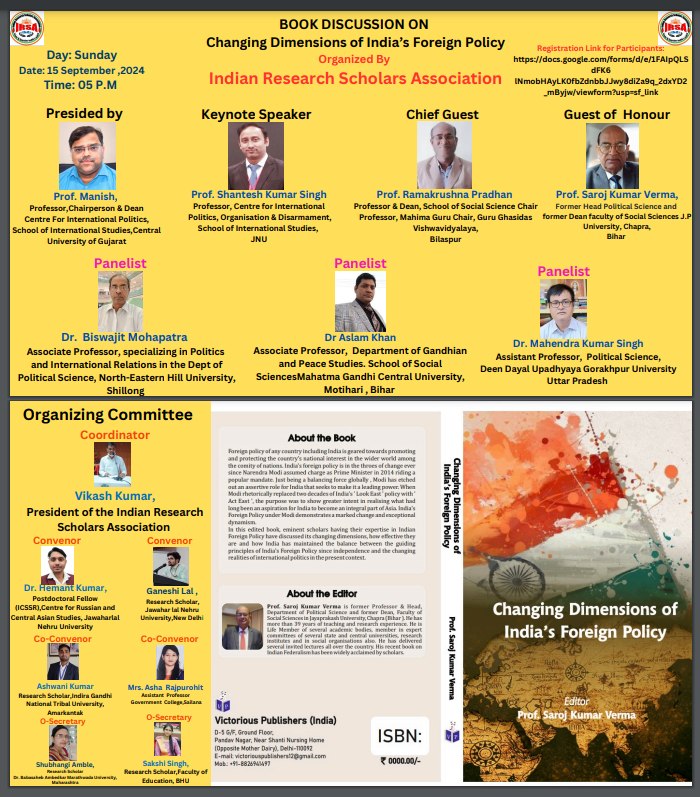Indian Research Scholars Association organized a discussion on Prof. Saroj Kumar Verma’s book ‘Changing Dimensions of India’s Foreign Policy’ at 5 pm. This book has been edited by Prof. Saroj Kumar Verma, who collected research papers from eminent professors of political science from all over India and gave it the shape of a book. The coordinator of this program was Vikas Kumar, who is the current President of the Indian Research Scholars Association. He welcomed all the guests and presented the objectives of the book discussion to everyone. The keynote speaker in the discussion session of this book was Prof. Shantesh Kumar Singh, Professor of international Politics, Organization and Disarmament, Centre for International Studies, JNU. This session was chaired by Prof. Manish, Professor, Chairman, and Dean of the Centre for International Politics, Centre for International Studies, Gujarat Central University, who presented his critical views throughout the session. Prof. Ramakrishna Pradhan, Professor and Dean, School of Social Science Chair Professor, Mahima Guru Chair, Guru Ghasidas University, Bilaspur, was present as the chief guest. Three panelists from leading universities of India were present in this book discussion, including Dr. Biswajit Mahapatra, Associate Professor, Department of Political Science, North-Eastern Hill University, Shillong, Dr. Aslam Khan, Associate Professor, Department of Gandhian and Peace Studies, Faculty of Social Sciences, Mahatma Gandhi Central University, Motihari, Bihar and Dr. Mahendra Kumar Singh, Assistant Professor, Political Science, Deen Dayal Upadhyay Gorakhpur University, Uttar Pradesh. In this session, in the book’s preface, the editor, Prof. Verma, said that Indian foreign policy is changing after 2014, and new sequences are being reflected in it. I have tried to explain those changing aspects through this book. I am very grateful to the authors who have sent their articles to this book. As the keynote speaker, Prof. Santesh Kumar Singh said that this book will be very useful for research scholars and students because it has compiled the entire changing scenario of India’s foreign policy. He said that India’s foreign policy is based on the principle of maintaining friendly relations with all nations while following its national interests. India has always been a supporter of peace and stability in the world, and its foreign policy is guided by the values of democracy, respect for human rights, and multilateralism. Prof. Pradhan, the chief guest of this session, said that foreign policy can never be static, so analysts have to analyze foreign policy, keeping this aspect in mind. He also said that we are living in a dynamic world. Therefore, India’s foreign policy is designed to be proactive, flexible, and pragmatic so that quick adjustments can be made to face emerging situations. However, in the implementation of its foreign policy, India invariably follows basic principles on which there is no compromise. Dr. Mahapatra, who was present as a speaker, said that India’s foreign policy is dynamic but there are some challenges in it too. Keeping this fact in mind, there are broadly three types of challenges: first ensuring peace on the border, second relations with superpowers and third future issues i.e. food security, water, energy and environment. The second speaker Dr. Aslam said that this book addresses all the dimensions that are necessary for Indian foreign policy. He also said that this book also addresses the changing political regime and foreign policy in Afghanistan. Dr. Mahendra Kumar, who was present as the third speaker, said that the structure of Indian foreign policy is constantly changing. In this scenario, this book is very relevant. Prof. Manish, who is chairing this session, while talking about the contemporary structure, said that technology will be an important determining factor of foreign policy in the coming times. Therefore, foreign policy scholars should also discuss in this regard. He further said that foreign policy has some basic characteristics, but they are not permanent. Due to changing international circumstances, the foreign policy of the country keeps changing. India follows some basic principles in conducting its foreign policy, from which it has not deviated much. After independence, an attempt has been made to fulfill the primary objectives of India’s foreign policy through some principles. Research scholars and students from major universities and colleges of India were present in this session. Ganeshi Lal, researcher, Ashwini, researcher, Naina Prasad, researcher, Neha Prasad, Minati, Miji Singh and Sunita Yadav etc. participated in this lecture. This lecture was organized through Google Meet.

